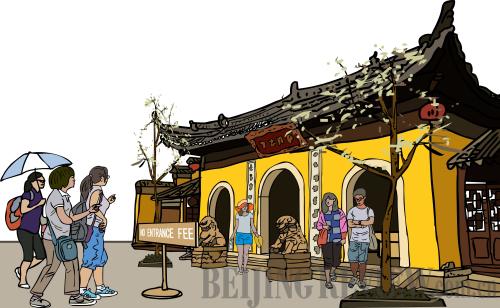|
 |
|
(LI SHIGONG) |
From May 10, visits to 29 temples in central China's Hunan Province are free of charge. This was a decision made by a group of Buddhists, led by Master Shenghui, Vice Director of China Buddhism Association.
Prior to this, some temples, such as Guanghua Temple and South Putuo Temple in Fujian Province and Ciyun Temple in Chongqing, also ceased charging for entry since April.
Ticket income makes up revenue for daily temple operation, but entry fees also keep many Buddhist believers out of temples. The free entrance campaign has thus gained wide support from the public as a measure to resist the commercialization of temples. The following are excerpts of opinions:
Kauangdaanxiaofeng (people.com.cn): The cancellation of entrance fees to temples is praiseworthy. Because of free entry, more people will visit temples to pay tribute to Buddha and learn about the religion. Subsequent economic loss can be made up in other ways. It is indeed necessary to prevent excessive commercialization of temples.
Xie Yong (The Beijing News): The campaign to make temple entry free is a great means to restore temples to their original status—not money-making scenic spots, but holy religious places, where monks keep religious doctrines alive.
It is an abuse of market rules to impose temple entrance fees on visitors. The fact that temples are religious facilities demands that they be open to all.
These temples in Hunan are showing an increasing sense of independence as social organizations. Meanwhile, local governments have also realized the distinction between themselves and temples and will not intervene in the latter's affairs in terms of entry fees. For temples, the top priority is to win trust and credit from believers. To profit via ticket sales may be good in the short term, but will damage the credibility of Buddhism over time. The government needs to transfer some interests to temples and help restore them to their original function.
In Taiwan, religious facilities are free. Comparatively speaking, on the mainland, due to the involvement of local governments and even companies in temple operations, the situation has become rather messy. While losing credit, temples are used by local interest groups as a tool to profit.
The existence of religious organizations, from a secular perspective, should address bad and ugly social behavior while improving human nature. The move of the temples to stop charging entry fees is setting an example for the rest of society.
| 